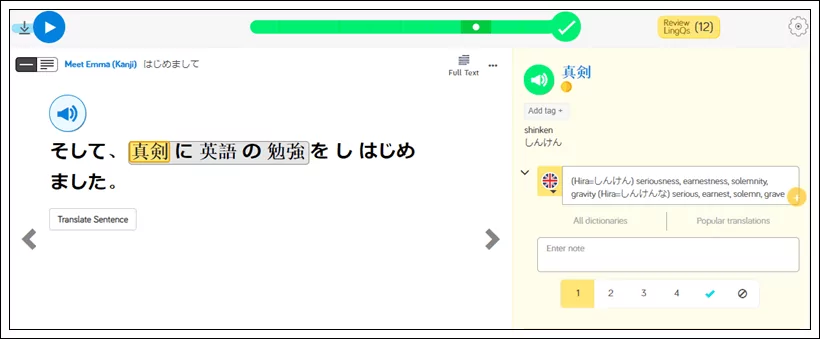Get to Know Japanese Adverbs in 5 minutes
Adverbs are words that tell more about the verb of a sentence: when, where or in what way it was done. Thankfully, Japanese adverbs are really easy to use: they don’t require any special conjugations or tricky particles and can go pretty much anywhere in a sentence. Not all of Japanese is so difficult!
That being said, just because they’re easy doesn’t mean they aren’t important. Adverbs are the difference, literally, between speaking Japanese and speaking Japanese fluently.
Here are a few to get you started.
Japanese adverbs of time
Adverbs of time tell us about when something is done.
|
Later 後で |
Already もう |
Recently 最近 |
Immediately |
Tomorrow 明日 |
明日学校がないので、どこか遊びに行きたいな。
あしたがっこうがないので、どこかあそびに行きたいな。
There’s no school tomorrow so I want to go somewhere and have fun. (casual)
最近、ラタトゥイユはやっぱりネズミからできていないということがわかった。
さいきん、らたとぅいゆはやぱりねずみからできていないということがわかった。
The other day I discovered that ratatouille is not, actually, made from rats. (casual)
Japanese adverbs of frequency
Adverbs of frequency tell us how often something is done.
|
Always いつも |
Often よく |
Sometimes |
Occasionally |
Never 一度も |
個人的に言えば、私はよくLingQで日本語を勉強しています。
こじんてきにいえば、わたしはよくLingQでにほんごをべんきょうしています。
Personally speaking, I often study Japanese on LingQ.
私はたまにメロンパンを全部一口で食べてしまう癖があることで知られている。
わたしはたまにめろんぱんをぜんぶひとくちでたべてしまうくせがあることでしられている。
I’ve been known to occasionally eat an entire melon bread pastry in a single bite. (casual)
Japanese adverbs of manner
Adverbs of manner tell us how or in what way something is done. Japanese onomatopoeia also function as adverbs.
|
Really 本当に |
Alone 一人で |
Together 一緒に |
“With a friendly grin” にこにこ |
Twinkling |
彼女の目はきらきらと缶詰のように輝いた。
かのじょのめはきらきらとかんづめのようにかがやいた。
The woman’s eyes twinkled like a tin can. (lit: shone in a twinkling fashion; casual)
* Onomatopoeia are often followed by the particle と
いつもこういうくだらないことを言っているから、私は結局一人になるだろう。
いつもこういうくだらないことをいっているから、わたしはけっきょくひとりになるだろう。
I’ll probably end up alone because I’m always saying dumb things like that. (casual)
Making adverbs from adjectives
In the same way that many English adjectives can be made adverbs by adding ~ly, many Japanese adjectives can also be turned into adverbs via a simple two step process.
For い-adjectives, replace the final い with く。
悲しい(かなしい)sad → 悲しく sadly
早い(はやい)quick → 早く quickly
For な-adjectives, simply tack a に onto the adjective’s root form.
静か(しずか)quiet → 静かに quietly
簡単(かんたん)simple → 簡単に simply
この質問は、普通ならそんなに簡単に答えられるものではありません。
このしつもんは、ふつうならそんなにかんたんにこたえられるものではありません。
Normally, this question is not something that could be so easily/simply answered.
しかし、ありがたいことに、教師用の教科書も持っていたので、答えは問題なく早く見つけた。
しかし、ありがたいことに、きょうしようのきょうかしょももっていたので、こたえはもんだいなくはやくみつけた。
Thankfully, however, I found the answer quickly with no problems because I also had a teacher’s edition of the textbook. (Casual)
Learn Japanese adverbs in context
Learning a language in context goes a lot further than trying to remember individual words. Instead of making a list of Japanese adverbs, why not find content you enjoy that contains a variety of adverbs that you can learn how to use.
Learn Japanese online using LingQ. LingQ is packed with 100s of lessons that have been professionally recorded and transcribed by native Japanese speakers so you can read and listen as you study. There’s a variety of topics to choose from such as everyday conversation, questions about work, sports, and much more.

If the lessons LingQ offers aren’t your cup of tea, you can import content from the web into LingQ. For example, you can import anime into LingQ from a variety of sites and LingQ will create an easy-to-follow lessons using anime subtitles and audio. Pretty sweet, right? Take it on the go using LingQ’s mobile app (Android or iOS) and study anytime, anywhere.

***
Sami is slowly dancing his way around the world, learning languages as he goes.


